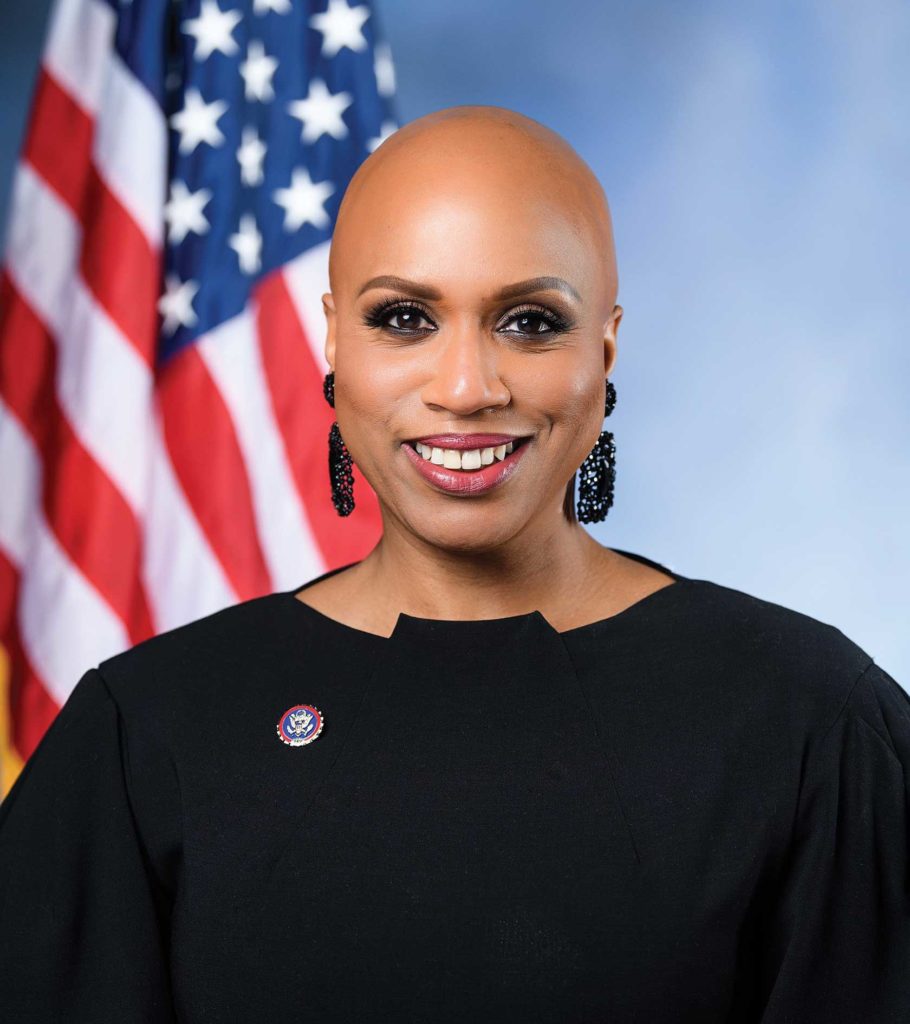Pressley: no military weapons for police
Seeks ban on military equipment transfers

Last Thursday several progressive lawmakers, led by Massachusetts Congresswoman Ayanna Pressley, urged the federal government to end the transfer of military weapons to local law enforcement through administrative action.
In a letter addressed to the Biden administration, lawmakers argued that providing police with weapons like high-caliber firearms, gun silencers, grenades and grenade launchers, armored vehicles and weaponized drones serve to make the public less safe and harm the already poor relationship many Americans have with police.
“Militarized law enforcement increases the prevalence of police violence without making our communities safer,” the lawmakers wrote to the federal agencies. “In addition, the militarization of law enforcement creates a culture and a mindset contrary to the mission of the police — to protect and serve.”
The lawmakers noted the disproportionate impact police militarization has on communities of color and asked the agencies to provide an update on the implementation of President Biden’s police reform executive order.
“When law enforcement has access to military equipment, they are more likely to use it, rather than other more appropriate and traditional law enforcement tools,” the lawmakers continued. “Furthermore, the negative effects of police militarization disproportionately affect communities of color…Ending police militarization will help to make our communities safer.”
The lawmakers’ letter follows President Biden’s May executive order on police reform, in which the administration committed to studying the impact of these weapons transfers before determining whether to prohibit them outright.
Its message is supported by national civil rights groups including the American-Arab Anti-Discrimination Committee (ADC), Arab American Institute, Bend the Arc: Jewish Action and Beyond the Bomb.
In Massachusetts, the Muslim Justice League has worked for years to end the exchange of military weapons to local police forces, as their membership finds itself disproportionately impacted by misguided “counterterrorism” tactics.
“Much of what we’re seeing happen locally in terms of surveillance, and militarization, is often justified by the war on terror,” MJL Executive Director Fatema Ahmad said in a conversation with the Banner.
Ahmad pointed to the extension of weapons use beyond direct counterterrorism efforts like the response to the Boston Marathon bombings, pointing to tear gas and pepper spray use during the summer 2020 racial justice protests that occurred throughout the city.
“We know that policing disproportionately impacts Black and brown people, even when we’re standing up for our rights. And so any enhancement of their technology, whether it’s through surveillance technology, whether it’s equipment, whether it’s literal weapons, and things like tear gas, the thought is that it’s going to exponentially harm Black and brown people,” Ahmad said.
A 2014 ACLU report on police militarization in Massachusetts, titled “Our Homes Are Not Battlefields,” shows how the impact of militarization of law enforcement in the Bay State has harmed residents. Not only do they highlight the fact that in less than a decade more than 1,000 military weapons were transferred to Massachusetts officers from the Department of Defense, but that in one incident, the use of such weaponry resulted in the death of an elderly Framingham man.
In 2011 a local officer killed 68-year-old Eurie Stamps when the city’s SWAT team used battering rams and flash-bang grenades to break into his apartment in search of Stamps’ stepson and another man suspected of dealing drugs.
Framingham agreed to a multimillion-dollar settlement to be paid out to the Stamps’ family and as of last year, an FBI investigation was continuing to look into the incident.
However, since Stamps’ death, Massachusetts police departments have continued to acquire military-style equipment. In 2020, then-councilor Michelle Wu dug out documents showing the Boston Police Department spent nearly $200,000 to arm officers with semiautomatic rifles amongst other tactical gear in the first 5 months of the year.
In response to Wu’s highlighting of the acquisition and subsequent concerns from fellow councilors, department spokesperson Sergeant Detective John Boyle, told reporters from the Boston Globe that BPD, “takes its responsibility to protect the people of Boston seriously and a large part of that responsibility is being prepared with the necessary equipment.”
As far as Ahmad knows, Massachusetts law enforcement agencies have doubled down on their acquisition of military-style weaponry — most recently BPD has gone so far as to sue the city over a ban on tear gas and rubber bullets.
“Many people have pointed out that it’s considered a war crime to use these in terms of war. And yet, we can barely even get the Boston Police Department to say that they’ll check with a few different supervisors before using it on protesters,” she said.
The letter also urges direct action on a proposed amendment by Rep. Pressley to the National Defense Authorization Act that would halt the Department of Defense’s 1033 program that transfers military equipment to federal, state, local and tribal law enforcement. It does not stop departments from purchasing such equipment from private sellers.
Advocates like Ahmad hope that cutting off the pipeline from the defense department will at least slow the acquisition.
“The 1033 ban would be significant across the country. And I think, for us here locally, MJL really thinks that the city needs to investigate what are all the ways that the Boston Police Department is acquiring equipment and technology and weapons.”






